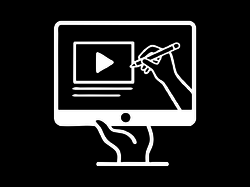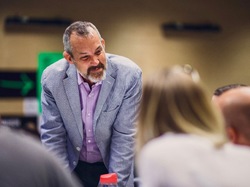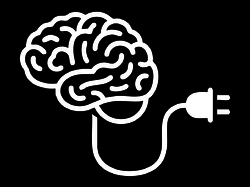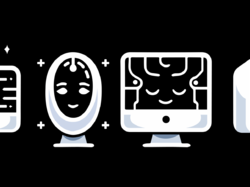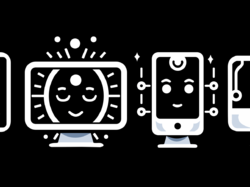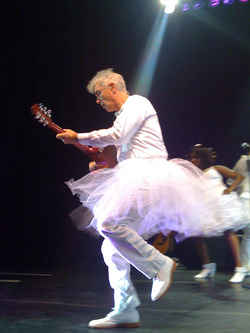
Last night I had the good fortune to find myself in the front row of a David Byrne concert, just a few feet from the man himself. The show was terrific, an amazing experience all around, and I had a huge, silly grin plastered on my face for all 120 minutes. Blissed out.
It wasn’t just that Byrne and his ensemble sounded so great. It wasn’t only that they threw themselves into the show with so much energy, spirit, and humor. Or that the choreography had such an endearing, almost homespun feeling (and… tutus!). No, the thing that made it such a great personal experience for me was that it was so evidently a great personal experience for David Byrne.
After every song, he seemed delighted and even surprised by the audience’s applause. He seemed buoyed, actually elated, by this exchange between musician and audience, and this enthusiasm reflected back into his performance, back onto us. The show was fresh and new and crackling with energy.
But here’s the thing: It’s not fresh and new. This tour has already seen something like 80 concerts in the last seven months. Many of the songs were from Byrne’s Talking Heads days, tunes he’s been performing for more than three decades. And yet the look on his face last night was as if he’d just discovered the pleasure of performance right then and there. He seemed at once thrilled and bashful. David Byrne has always glowed with a kind of boyish wonder, even when engaging in social criticism, and his boyishness hasn’t faded at 56.
David Byrne makes stuff, lots of it: songs, movies, books, photos, operas. I’m sure it helps that he’s, y’know, a creative genius. But no matter how clever you are, making stuff—inventing something new—is hard and challenging work. While invention always starts with passion and enthusiasm, it’s easy to lose both in the hard slog of bringing it to fruition. Add to that the relentless grind of on-the-road touring—the symphony of airline flights, hotel rooms, rental cars, long stints away from loved ones—and it must be tough to keep the thread of the original passion: Well, how did I get here?
Of course, making it seem fresh and effortless is the essential job of a performer. But not all performers can do it. I’ve seen concerts where the musicians seem completely indifferent to the performance and the audience, traipsing right up to the edge of outright hostility. Of course, that eventually happens to most of us in the work that we do, even when it’s work that we love: The hassle of the work sometimes overtakes the reason we started doing it in the first place. This is something that I often struggle with, spinning the words and code and designs that I make for a living. I have to step back from the work, remind myself why I’m doing it, why I got started in the first place. It’s a matter of self-preservation, sure, but more important a matter of maintaining creative momentum. If you conflate the dreary parts of your work with the creative payoff, you risk poisoning your inspiration.
After 35 years of performances, Byrne seems able to keep the two aspects in perspective. “After 10 days off the treadmill, we’re back in gear and it feels wonderful—we’re ecstatic,” Byrne wrote in his blog after the first show of the European tour, two weeks ago. “This is why we put up with the jet lag and the constant dislocation.”
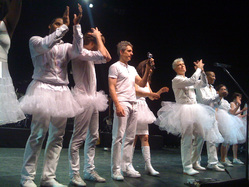
The cool thing is that this passion—this “ecstasy,” to use Byrne’s word—for making and sharing is contagious. When I return home from a terrific concert or an inspired art exhibit, I always have new energy for my own creations. There’s something galvanizing about seeing something created with care and presented with gusto: music, books, JavaScript code, paintings, meals, whatever. Seeing someone else’s creative payoff reminds me of the creative payoff in my own work; it restores courage and passion. And hey, that’s not a bad takeaway from a rock concert.
In the end, I suppose it’s about looking forward, remembering what you’re working toward. When Byrne introduced the show, he said he’d be playing some of his new stuff (applause) as well as some of his old stuff (applause). And then: “So there’s the present, and there’s the past. And then we have the future. And maybe we can give a little applause to the future, too. If we do that, if we think about it that way, maybe the future will be a little bit better.”

